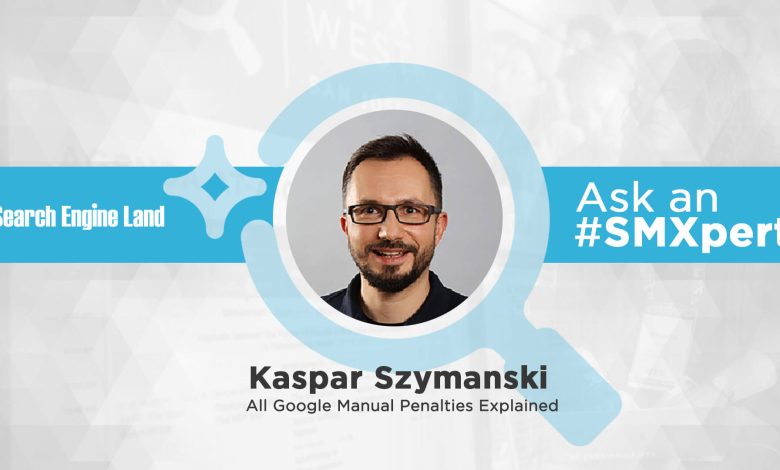
The Ask the SMXpert series continues with the question and answer (Q&A) segment from sessions held at Search Marketing Expo (SMX) West 2018.
Today’s Q&A is from the All Google Manual Penalties Explained session with speaker Kaspar Szymanski, introduced by moderator Chris Sherman.
Moderator Chris Sherman: For those unfamiliar with Kaspar, he is a veteran of the Google Search Quality team. He played a key role in global web spam tackling initiatives and was a public figure leading Google webmaster outreach and communication efforts. Kaspar offers valuable advice, having spent years helping clients recover from penalties and regain their standing with Google.
Question: What happens when you get an unnatural outbound links penalty but never sold links? The website used proper FTC disclosure and all outbound links in articles were no-follow. However, the site had many affiliate links that were dofollow. After changing these links to no-follow and submitting a reconsideration request, the site was approved. Is it common for sites to receive penalties for using dofollow affiliate links?
Kaspar: In short, yes. FTC disclosure doesn’t affect SEO or Google’s perception of links. Outgoing affiliate links are generally commercial and have specific anchor texts, necessitating the use of nofollow attributes to avoid violating Google Webmaster Guidelines and risking a penalty.
Question: Is it true manual penalties aren’t removed manually? That a bot, instead of humans, reads through the reconsideration requests?
Answer: No, that’s not correct. A human reviewer reads through the reconsideration request. Google confirms that these requests are handled by real people, and good documentation aids the reviewer in understanding the steps taken to address the manual action.
Question: To prevent a penalty, do you still suggest disavowing links, considering Google’s update stating they would ignore low-quality links?
Answer: Disavowing undesirable links is always a good approach. Although Google tries to identify low-quality links, their algorithms are not perfect. It’s unwise to rely on Google to discount low-quality links, so disavowing them is recommended.
Question: I’ve heard that being too generous in disavowing can do more harm than good (until you get a penalty). What’s the right balance?
Answer: It’s not about balance but about disavowing links likely to harm a website’s Google search rankings or pose a penalization risk.
Question: With billions of websites on the internet, how does Google decide which site to apply a manual penalty to? Do they consider traffic or rankings?
Answer: Popular, high-traffic sites are likely to draw scrutiny, but other lead sources, such as competitor spam reports, are considered. Seasonal or trending query investigations, like those related to "Black Friday" or "Super Bowl finals," are also likely to be of interest because they are relevant to many Google users.
There’s nothing malicious about a site being reviewed. It is fair to say that popular, successful sites have likely been examined by the Google team at some point. Most investigated sites are not under suspicion and don’t receive penalties.
Question: Does Google evaluate spam/backlinks differently for adult sites? If yes, how?
Answer: No, there are no double standards for different verticals.
Question: Is hidden content a violation? Even if the content is relevant to the page and we hide it just for the page’s appearance?
Answer: It depends on the egregiousness and intent of the hidden content. Hidden content can increase the risk of penalization. Google understands content collapsed for user experience reasons, which is usually harmless. However, keyword-stuffed SEO content not serving users does merit a penalty.
Question: How do I know which links to remove? What constitutes a bad link?
Answer: Every link must be reviewed within the context of an individual backlink profile. Anchor text and its distribution separate merit-based link growth (diverse and natural) from intentional PageRank-passing link building (optimized with commercial terms). Landing page distribution and site quality, as well as whether they link to spam sites, are relevant factors.
Question: Is there a blacklist where Google collects data about penalized sites, and does this affect their ranking?
Answer: While penalties negatively affect site rankings, Google doesn’t maintain a blacklist. Sites violating Google’s Guidelines can recover and perform well in search results.
To learn more in-depth SEO tactics to avoid penalties, attend our SMX Advanced conference in Seattle next month. Top industry experts will share their tips, tactics, and strategies on topics such as:
- Advanced Technical SEO: Page Speed, Site Migrations, Crawling
- Advanced Technical SEO: Schema & Structured Data, JavaScript
- Optimizing For Voice Search & Virtual Assistants
- Deep Dive: Google’s New Search Console



